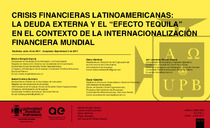Crisis financieras latinoamericanas: la deuda externa y el “efecto tequila” en el contexto de la internacionalización financiera mundial
Fecha
2017-06Autor
Rengifo García, Marino
Quintero, Isabel Cristina
Martínez, Diana
Sánchez, Óscar
Rincón García, Jair Leonardo
Tipo de contenido
article
Citación
Metadatos
Mostrar el registro completo del ítemDocumentos PDF
Resumen
El presente artículo expone una reflexión sobre la evolución
de dos de las más importantes crisis económicas
latinoamericanas del siglo XX: la crisis de la deuda externa
de 1982 y el “efecto tequila” de 1995, en el contexto histórico
de los procesos de liberalización financiera internacional.
Para tal efecto, se empleó la metodología de análisis
documental. Se abordaron importantes pensadores del
campo económico actual, como los Premio Nobel Paul
Krugman y Joseph Stiglitz; pensadores claves de la
economía latinoamericana pertenecientes a la CEPAL, como
José Antonio Ocampo, y de otras líneas de pensamiento
económico. Se identificaron como factores determinantes de
las crisis latinoamericanas referidas, el excesivo, ineficiente e
irresponsable gasto público, los efectos procíclicos inducidos
por los capitales internacionales “golondrina” y el déficit
crónico de divisas por largos periodos, al igual que la
influencia recesiva de las “políticas de choque” sugeridas por
el FMI y el Banco Mundial en las economías de la región.
Como principal conclusión, se aboga por una arquitectura
financiera internacional más transparente, que responda a
las necesidades de las economías nacionales y no de grupos
de interés particulares This article reflects on the evolution of two of the most
important Latin American economic crises of the twentieth
century: the 1982 debt crisis and the 1995 “tequila effect” in
the historical context of international financial liberalization
processes. For this purpose, the documentary analysis
methodology was used. Important thinkers from the current
economic field, such as Nobel laureates Paul Krugman and
Joseph Stiglitz, and key thinkers of the Latin American
economy belonging to ECLAC, such as José Antonio
Ocampo, and other economic thinkers were approached. The
main determinants of the Latin American crises were the
excessive, inefficient and irresponsible public spending, the
procyclical effects induced by the international capitals
"swallow" and the chronic deficit of foreign exchange for long
periods, as well as the recessive influence of the "Shock
policies" suggested by the IMF and the World Bank in the
economies of the region. The main conclusion is that a more
transparent international financial architecture is required that
responds to the needs of national economies and not to
particular interest groups
ISSN
2382-3283 (En línea)
Palabra/s clave
Crisis Financiera Internacional
Crisis Financiera -- Latinoamérica
Colecciones
El ítem tiene asociados los siguientes ficheros de licencia:


